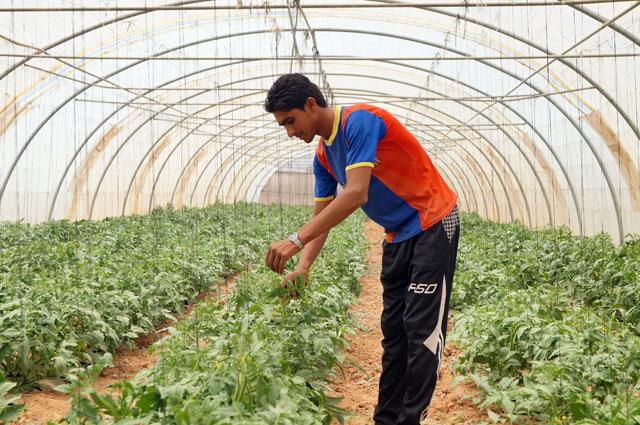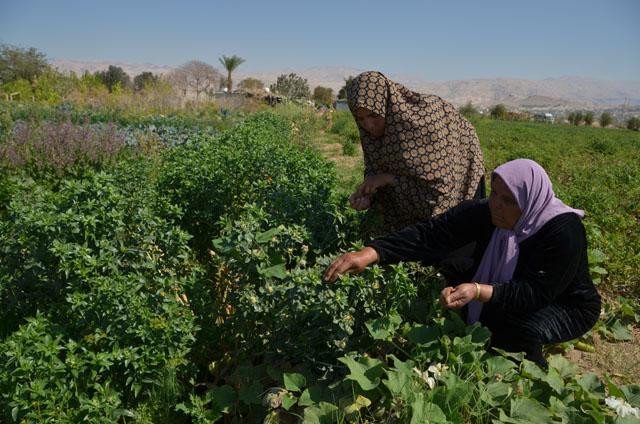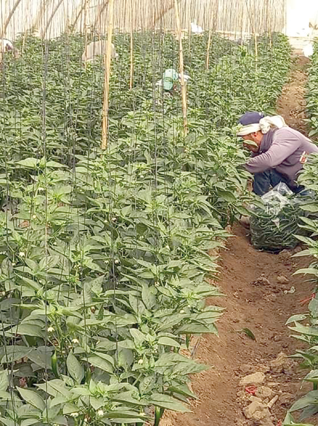You are here
Pakistani farmers find work, a life for themselves, their children in Jordan
By Rajive Cherian - Jul 02,2016 - Last updated at Jul 03,2016

Abdul Latif, a 17-year-old Pakistani, tends to crop at his family’s leased farm in Sahab recently (Photo by Rajive Cherian)
SAHAB — During their spiritual and agrarian wayfaring, a group of Baloch and Sindhi farmers settled in the fertile land of the Jordan Valley in the 1960s and realised that the countryside was essential to the sustenance of their offspring, a second generation member of the Pakistani farming community in Jordan recounted.
“The main aim of my parents’ generation was to perform the Hajj. At that time, the situation in Pakistan was not good and they couldn’t afford a plane ticket, so they embarked on the journey on foot,” Khadim Lashari said, referring to the greater Muslim pilgrimage to Mecca.
“When they arrived in Iran, they ran out of cash. The only trade they knew was farming, so they worked there for a couple of months in the fields, saved some money and continued their trip to Iraq.”
In Iraq, financial exhaustion forced them to postpone their trip again and work, Lashari said, adding that “due to the political situation at that time, the Jordan-Iraq border was closed”, so they moved to Syria.
With an interim stop in Jordan, they reached their final destination: Saudi Arabia, Lashari said.
After performing the religious rites in Mecca, they moved to Jeddah. The farming community found themselves ineffective there, and while some settled, others returned to Jordan and started working in the farms, Lashari said from his leased farm in Sahab, southeast of Amman.
The migrant farmers found that time in the Kingdom favourable as the government was upgrading its agriculture sector on the East Bank.
According to Pakistan embassy estimates, there are some 16,000 Pakistanis working in the Kingdom, of which approximately 10,000 are employed in the farming sector.
Asked about the shift from the Jordan Valley to Sahab, Lashari told The Jordan Times in a recent interview that in summer, most of the farming community moves to other parts of Jordan, like Ramtha, Mafraq, Madaba and Sahab because of the heat. When the winter, approaches they return to the warmer valley.
“Though there are advanced farming systems which could help cultivation in one place year-round, average farmers can’t afford that, so we have to shuttle between Ghor [the Jordan Valley] and other places during the summer and the winter.”
The 41-year-old, who hails from Balochistan, runs his farm on 80 dunums of leased land with his family, on which they cultivate cucumber, tomatoes, potatoes and pepper.
Although they have been in the farming sector for decades, the family said the current crises in Syria and Iraq are not good for farmers in Jordan, as borders are closed, affecting the export of vegetables to Eastern Europe by road.
Exports to Gulf countries are limited to the summer season as they cultivate their own crops during the winter months, the family said.
“If the situation continues for another year or two, I don’t know what I will do; I may stop this farm and work as a labourer in any other farm, if they still exist,” said Lashari’s brother, Mansour Abdullah, 31, who was born in Jordan.
“The only trade I know is farming.”
“At times we were forced to give the produce to the livestock. I pray that the bloodshed ends and the situation will go back to normal,” Abdullah said.
After spending decades in Jordan, the Pakistanis said their cultural identity has been enriched by their years in the Kingdom.
“We like to preserve our identity and at the same time be part of Jordan," Lashari said.
“By the third generation, Pakistani identity is only in the passport, their outlook has become Jordanian. They go to school here; at home they speak a mix of Arabic and Balochi. They don’t even watch Pakistan TV programmes; they follow Jordanian TV and Arabic programmes,” added Lashari, who has a BSc degree in civil engineering and runs several other businesses.
Meanwhile, his nephew Abdul Latif, 17, a high school dropout, has been helping his uncles on their farm.
“I regret leaving school,” Latif said. For the time being, he continued, he is learning the technical side of the business with the hope of leasing land in the near future to start his own farm.
“What the third generation should focus on is education. It’s good to be an educated farmer, as you will not be exploited,” Lashari said.
Related Articles
As the world increasingly chooses to turn to mechanised means to solve its problems, one family in Ghor Al Mazraa is sticking to traditional measures in running their flourishing farm.
AMMAN — The mounting challenges faced by the agricultural sector, including changing weather patterns and rising production costs have left
AMMAN — Farmers are welcoming the late arrival of rain which has affected most regions across the Kingdom, during the past few days. Pr

















